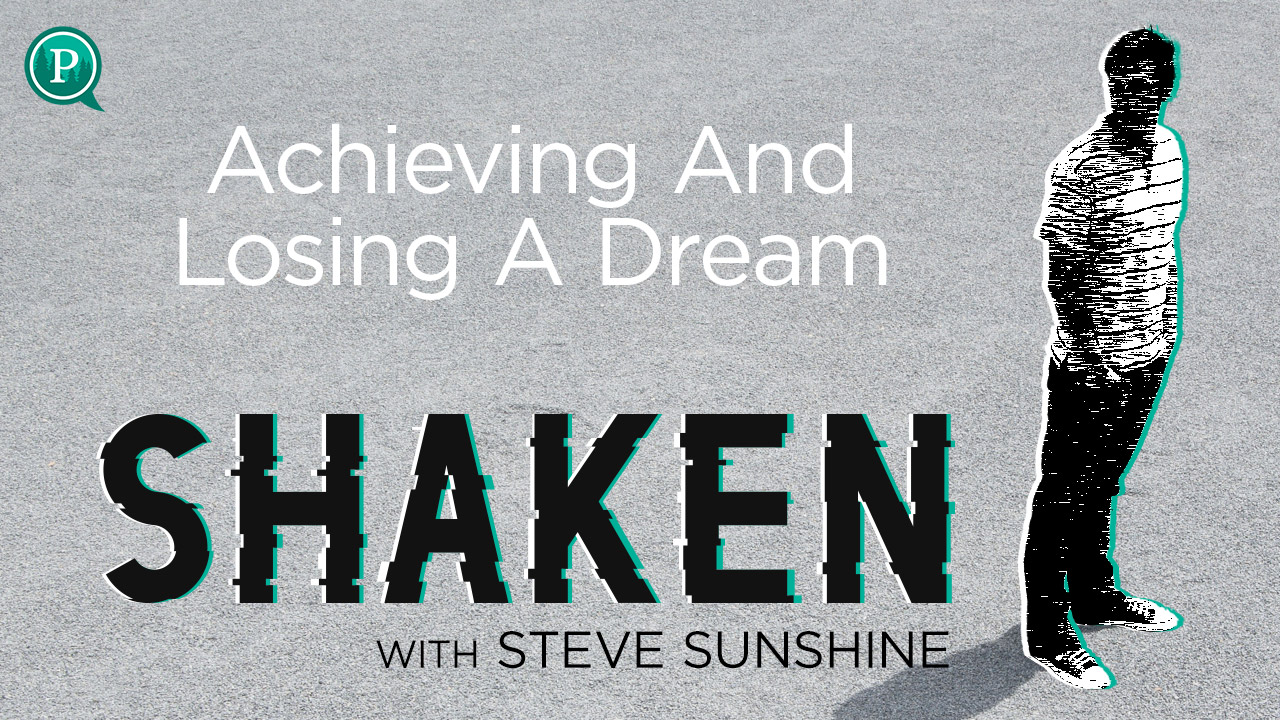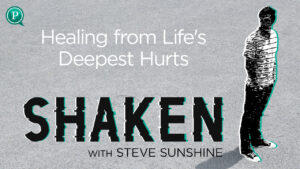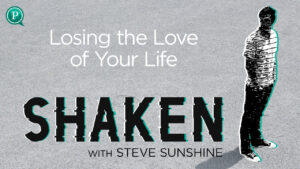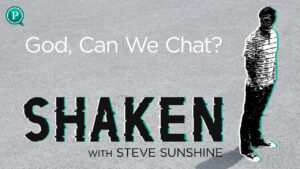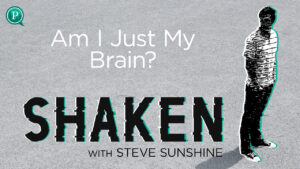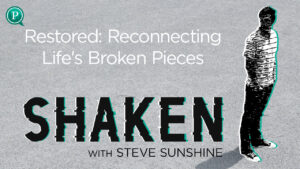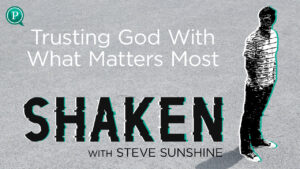Jesse Bradley was like a lot of kids in that he dreamed of being a professional athlete, Unlike most other kids, he saw his dream come true! But then it was snatched away by a health crisis. It was a painful loss, but God was in it. Today Jesse is a pastor at Grace Community Church in Auburn.
Show Notes:
Find Jesse: Online | Instagram | Facebook | X
- Book: The Power of the Second Thought How to Live With Indestructible Hope
- Jesse’s podcast: The Bonfire
- Jesse’s Church: Grace Church in Auburn
Transcription:
Steve Sunshine:
We live in a time of unprecedented comfort. We value safety and security, and maybe that’s why it’s so easy for us to be shaken when the straight road we’re on takes a sudden curve and seems to be pointing us in a direction we don’t want to go. Welcome to The Shaken Podcast. I’m Steve Sunshine. Your confidence, your mood, your perspective, even your faith may be shaken because of something that’s happened in your life. Jesus told us we’d have trouble in this world, so we’re shaken but not surprised. He also said, “Take heart, I have overcome the world.” In this podcast, you’ll hear honest conversations with people who have or are going through life-altering hard times and have found that God was with them in the midst of it all.
When you’re a kid, you get asked the question, “What do you want to be when you grow up?” Obviously, not everyone gets to be what they wanted to be as a kid, otherwise we’d have a lot of ballerinas, princesses and superheroes. But what if your childhood dream actually came true, and then in the blink of an eye, it was gone? Jesse Bradley is a pastor at Grace Community Church in Auburn, Washington, and a former professional soccer player. Is that right?
Jesse Bradley:
That’s it. Thanks, Steve.
Steve Sunshine:
Those are two things that… I mean, I’m not sure that when the church was hiring, they were going, “If we could only find a good goalkeeper.”
Jesse Bradley:
You’re right. I never had many questions about goalkeeping in the process, but yet, it did prepare me in a lot of significant ways as well, so I’m grateful for that experience.
Steve Sunshine:
I want to talk a bit about the road that got you where you are. And let’s start with soccer itself. How did that become a passion for you?
Jesse Bradley:
Steve, I grew up in Minnesota and if you know anything about the winters there, it’s survival and then looking for something exciting. And I grew up on the Minnesota campus, which is a big 10 school, University of Minnesota. And as I went to the different games, I told my parents when I was two years old, “This is what I want to do when I grow up, professional sports.” And some people know early on in life what they want to do. That was my dream. And in high school, I played three sports. We won state championships. I played at Dartmouth College, we won Ivy League championships. I played overseas. And literally, that first time I signed a contract, it was the childhood dream coming true. I was focused on that my entire life.
Steve Sunshine:
How did you settle on soccer? You said you played three sports in high school.
Jesse Bradley:
Basketball was my passion, but sometimes in life you want it to go one direction, but you don’t actually have the skills to take it that far.
Steve Sunshine:
I’m aware of that.
Jesse Bradley:
Yeah, that’s it. And college basketball, I probably could have played division three, but that wouldn’t have been a professional career. And then, my soccer coach saw me playing basketball and with the hand-eye coordination and the skills thought, “This guy could be a goalkeeper,” and started to train me early on, and that’s really the shift. And he ended up being one of the very best soccer coaches in Minnesota. Our high school team sent several players professionally. And I would say the culture he created was a love for the sport, that family environment. And I just started to acquire… Even though I didn’t grow up watching a lot of soccer. Some nations, soccer is everything. It’s the clear number one sport, nothing’s close. But in America it’s maybe fourth. I mean there’s a lot of choices in America. And as I started to play more, I realized this really fit me and I think a lot of people can relate to that. You didn’t see it coming, but it’s a great blessing. And as you step into it, you have talents and gifts you weren’t even aware of.
Steve Sunshine:
So, you turned pro. Where did you get to play?
Jesse Bradley:
I played overseas and the place that I really focus on is Zimbabwe, although I went to Scotland and was able to play over there too. And the experience overseas was so different in those two places. Scotland, it was rugged, the locker room’s competitive. There’s not a lot of hugs and emotion, there’s not a lot of warmth. So, in some ways it builds a lot of tenacity and character. In Africa, the minute you get off the plane, you feel the warmth and the embrace, the love. And people are so grateful that you’re there. The connection, the joy. I love Scotland. I mean that place is close to my heart, but Zimbabwe was a place where relationally, it was so supportive and there was a strong connection.
And yet, going to Africa, I had never been around poverty and drought and AIDS and famine and lack of jobs and all of the conditions. And it really stood out to me, and this fits right in with your podcast, that people there have so much joy. They’re literally singing and they have a generosity and a hospitality that some people don’t have that have big bank accounts, great houses, secure retirements. And their kindness, unselfishness, that taught me something that sticks with me today, it really does.
Steve Sunshine:
Yeah. Even somebody without a big house or a lot of money in the bank in this country is better off than almost all the rest of the world. It’s kind of remarkable. And then, you see that generosity and it really makes you reevaluate everything. I don’t know anybody who’s come back from a mission trip without going, “I have got some thinking to do.” The is the trick is to not let that fade because it will if you’re not careful.
Jesse Bradley:
You’re right. I was blown away coming back from Africa at our supermarkets and how many options we have. I mean if you just want to get milk or yogurt or crackers or cereal. I mean over there I felt grateful if there’s anything on the shelf, and you don’t forget that. It really penetrates your heart. And like you said, it can create a generosity and a vision that’s global because now you’re aware of how much you have. And yet, at the same time I also became aware that gratitude is a choice. Because gratitude is not about how much you have, it’s about what’s going on in your heart. And some people that have very little are far more grateful than other people who have 100 times that much. And the importance of gratitude, hospitality, learning how to not give your circumstances too much power, those are all life lessons that again, for me, that shaped my life in a profound way.
Steve Sunshine:
So, how long were you in the Zimbabwe?
Jesse Bradley:
I was there for one season, and then, sadly and tragically my career ended. I was taking a medication to prevent malaria. And even though it was prescribed every week, it built up toxic levels in my system and my body started to shut down. I was pushed to the brink. And that’s physically, emotionally as well because there’s side effects, anxiety, panic attacks, waves of depression. This thing wrecked my body. And then, of course, it pushed me that brink spiritually as well. I feel like in many ways I lost my dream, I lost my life. And it was starting over, and it took 10 years to fully recover, but it was one year that I was fighting for my life. And so, I had to return to the States and then begin a medical journey of going to different doctors for each symptom, not knowing what the cause was, paying out of pocket, going to Stanford.
And I’m supposed to, at that time, keep taking the drug for another month. But I’ll tell you, I had a moment with God. And if you’ve ever been through something very difficult, it is that dark night of the soul. You do cry out to God. And in those moments, I sensed God clearly telling me, “Don’t continue with the medication.” At that time, I had all the physicians telling me and family friends telling me, “Keep taking it,” because they were well-intentioned and malaria can stay latent in your system. And they assumed if I contracted malaria on top of that, I would die. They wanted to protect me.
And yet, at that time we didn’t know. The Stanford doctor was the first one who even mentioned the possibility, there was 10 or 12 possibilities for the cause of my illness, and at that time I said, “No,” a firm, “No.” Because in prayer, I sensed it from God. We had my blood sent to the Center for Disease Control and they found weeks later that there were toxic levels of the drug in my system. That decision saved my life and God will meet you in that low place. When you don’t have answers, when you’re not sure what to do, you go to God and just cry out and God will still be there. God will still direct you. And even when it feels hopeless, God is still faithful.
Steve Sunshine:
So, God was faithful… Well, he is faithful, period. But you saw his faithfulness in being able to get through the illness, but that was it for soccer at that point?
Jesse Bradley:
That’s right. And I had a sense because of the seriousness of my condition, I might not be able to return to soccer, and that’s how it played out. That is something that I continue to grieve at different points in my life. I’m not trying to wrap a ribbon around this one today. When I talked about how God protected me from taking the medication that was causing the illness, I was still wrestling with God’s protection overall. Because I thought, “I prayed about going to Africa. This has been my childhood dream. God gifted me to do this. How can it all be snatched away?” And I had to go through scripture and really wrestle with what is God’s guaranteed protection? What does his protection look like? And trying to avoid the two extremes, because the one extreme is that nothing’s going to harm me because I’m a follower of Jesus, because I’m loved by God because of a relationship with God. And that’s just not true.
But then, the other extreme would be to say, “God, you didn’t protect me from this illness.” Therefore, God doesn’t protect me at all. He doesn’t have any oversight or no sovereignty, and that would be false. Instead, there’s this middle ground where it’s not always clear how much will God allow us to suffer. And walking through that middle ground by faith where I’m not resentful, I’m still trusting, and yet, I’m struggling. When I went through something so much bigger than what I could handle on my own, it caused about 10 significant shifts in my life. And I know we don’t have time to go through those, but I’m telling you like C. S. Lewis shares, “Pain is a megaphone to arouse a deaf world.” And God used that pain to shift my attitude, my calling, my career, my walk with him, my prayer life, my identity.
All these deep things would not have happened if I would’ve had amazing success on the soccer field and a long career. And we’d be sitting here talking about championships and different leagues overseas. That’s not how it played out. And yet, God is still good. And a lot of that was learned. It was the head and the heart and the soul, not just the facts. But that’s one part about it is… And the other part I mentioned is that when we lose someone close to us, grieving continues the rest of our lives. And similarly, when you lose a dream and a career, it just continues to come up at different points. I never had those 10 years as a goalkeeper. I never had those 15 years, and it wasn’t my choice, it wasn’t what I wanted. I’m grateful now I see what God did and I thank him. So, you can be full of hope and still grieve. You can be grateful and still grieve. And in heaven, I look forward to playing a lot of soccer. That will be the sport in heaven, right? That’s [inaudible 00:12:43].
Steve Sunshine:
Well, I’m not sure. Hopefully, it’s one of many.
Jesse Bradley:
Yes. I’ll take that too. You’re right.
Steve Sunshine:
So, what was that like emotionally? Tell us a little bit about that period of transition going from maybe even the stages of grief that everybody talks about, possibly denial, and acceptance, and whatever the other ones are. What was going through your mind and your heart as this was becoming real?
Jesse Bradley:
That’s a good question, Steve. I grew up in the Midwest and personally my family, some of the culture there, you simply endure it, you learn from it, you persevere, you do something better. When my parents got divorced at age seven, I didn’t cry a lot. I didn’t know how to process that, but I knew if I achieve academically, if I achieve athletically, that’s going to be the most positive response. Well, this was different because I didn’t have school, I didn’t have grades, I didn’t have a team, I didn’t have a job. Here I am just sitting in it. And even though I started out in denial saying to some friends, “It’s not that bad. It’s all right, I’ll be all right.” You could tell that just wasn’t accurate.
And so, I had to learn what are the other options? And this is where God started to really open me up. There’s a verse, Psalm 62 verse eight, “Pour out your heart to God, oh people. At all times trust in him. He’s our savior.” I didn’t know how to pray, pour out my heart to God. I knew how to intellectually pray. I knew how to pray something that sounded good theologically, that was sound. I didn’t know how to pour out my heart to God. I had an image of God that he was interested in my success, but he probably didn’t want to come in to the junk, the darkness, the loss, the grieving. I didn’t have any interest in grieving. I thought, “Why grieve? That’s not fun. Life’s too short. Why would I even enter in. Nothing about that sounds like something I’d enjoy.” And yet, grieving’s necessary.
So, I had to learn how to let other people in. I had to learn that God actually wants to come in. I had to open that door. I had to learn how to give him my burdens because it was too much for me to carry. And all these things, it was so new to me in my 20s and it took many years and I’m still learning in some ways. It’s not my go-to when things get hard to pour out my heart to God, just to give him burdens right away. And that’s an intentional choice. It’s part of worship. It’s part of closeness with God. I love the word abiding. Jesus says, “Abide,” in John chapter 15. That means come close. That means listen, trust. And when you abide with Jesus, you will bear fruit, even in the worst conditions of your life. The emotional is connected to the spiritual and the emotional is connected to your mind.
In my mind, I had to start to memorize scripture and go there. I call it the power of the second thought. Every first thought felt like it was negative. “I’m not going to get any better. There’s no hope. I don’t have friends right now. I don’t have a career. I don’t have a backup plan. There’s no guarantee I’m going to get better.” My mind would go in a ditch. And I had to learn to take a scripture. God is my refuge, strength and ever present help in trouble, and say that out loud and renewing of the mind through scripture. Let’s connect it to emotion. So, when I felt hopeless, the scripture in my mind would start to lift up my spirit and my emotion again. And coming out of the depression, anxiety, I had never had this panic attacks like that before. I had to choose a verse. Literally, I couldn’t drive for years because the stimulation was too much for me and a car coming close, my heart rate…
See, one of the physical conditions is my heart would quickly go to 160 beats a minute. The drug inhibits the inhibitors, so I couldn’t regulate my heartbeat. Therefore, if there’s anything stimulating my heart, tachycardia, racing heartbeat. And I had atrial flutter and heart murmur and abnormal heartbeat. So, I had to relearn how to drive years later, it was terrifying. And with that, again, that scripture and I go to Isaiah 41:10, “Do not fear. I’m with you. Do not be dismayed. I’m your God. I will strengthen you, help you with my righteous right hand.” The emotional aspect of overcoming fear that God would give me more courage than the fear I felt. I still felt fear, but God would give me more courage. I still felt sadness, but then God would lift me out of a despair and bring me hope and encouragement.
That journey is very significant and a lot of men don’t want to go there and identify their feelings, don’t know what to do. And I’m telling you, you can’t stuff it. When you’re going through something big, you can’t be in denial and stuff it and receive the healing. There’s no healing until the revealing, and I had to open up that part of my life with God and that’s a full relationship with God, but God will meet you there. And I love in John chapter 11, “Jesus wept at the funeral with those who were grieving, so he entered in. He cared and they wept with him. But then also he declares, ‘Whoever believes in me will have eternal life.'”
He is the resurrection in the life and he will resurrect emotionally. He will resurrect relationally, spiritually, and he has hope that’s greater than our despair. Yes, we feel discouragement, but that’s not the end of the story. Don’t give that discouragement and those feelings too much power and Jesus will meet you there and emotionally he will be the one who leads and guides. He’s a good shepherd. And that was a new part of my relationship with God.
Steve Sunshine:
Wow. I mean he definitely made himself known to you that he was with you in it, which is really awesome. I think he does that through scripture a lot. Like in my situation with Parkinson’s, I was on a medicine that it was a trial medicine. And it took a while to figure out what was going on, but I was having some pretty serious anxiety and depression. And I maintained that getting off of that stuff may have had a role in fixing it. I’m not sure. I’m not sure that it was the medicine, it’s not clear. But I do know that when I was thinking about all the things I used to be able to do better and stuff like that, “My grace is sufficient for you. My strength has made perfect in weakness. Therefore, I will boast all the more gladly in my weaknesses because when I’m weak, I’m strong.”
Paul asked three times to have that thorn removed and God essentially said, “No, but my grace is sufficient.” So, that was a lifeline for me. And there are a couple of other verses too. And I’ve been encouraging people to lean into God when there’s trouble, you may be tempted to shut off from him. You may be mad at him. If you are, tell him, but do anything but ignore him. And as much as you can lean in, he will lean back into you and you’re going to get comfort. I am not big on guaranteeing things, but I feel like I can pretty much guarantee that.
Jesse Bradley:
You’re right. And that’s a powerful testimony, Steve. Thank you for sharing about what you’re walking through and I would during the day say that verse, “My grace is sufficient for you. God will give me what I need for today. I’m not going to go borrowing trouble from tomorrow, but today, I’m going to… And he’ll give wisdom. He won’t leave me, forsake me.” If you’re listening right now and you have doubts, remember Thomas who had doubts, and yet, he stayed in the community of faith. Like you said, don’t just walk away from it all. God is still there. God is still good. Jesus showed up to Thomas. He knew Thomas was wrestling with doubts, but Thomas stayed open, stayed in the community of faith. Jesus showed up and then Thomas became very devoted.
Our doubts, God can use them because he’ll bring facts and the facts lead to faith. When we are going through something difficult, pain in my life, God used it to fuel and forge a new purpose and passion. Steve, our stories are similar in that we came to know Jesus later in life. And for me as a young adult and for you around 30. And I’m telling you because I know what it’s like to live without God, God has used that with a fire in my soul to reach people who don’t know God, who have doubts, who have questions. That was me. I had dozens of questions. Faith, I wasn’t sure I wanted it or it was real. I needed to see historical evidence. Similar, when we’re going through hard times, deep calls out to deep. And when God meets you where no one else can, you’ve got a story that is going to encourage a lot of other people going through the same stuff.
And I love to talk about how God brings hope and this hope is available to everyone. It’s a relational hope, it’s not just facts, it’s closeness to God. It’s a hope you can cultivate with the habits we’re talking about, listening to God, letting God in in prayer, scripture, standing on a promise when you feel like everything else has falling apart. These are some habits. You can cultivate hope. And God has an indestructible hope, because ultimately, his presence, his power, Jesus is the same yesterday, today and forever. We have an inheritance. And this is one of the things that eternal perspective for me, it’s like on my worst days, I couldn’t deny that I have an eternal glory that’s coming that far outweighs it, and it’s not even close. And when you realize that this suffering is short, it’s passing, that’s a game changer and that’s the promise of God that we can hold onto when we’re going through something difficult.
Steve Sunshine:
Going back to your story a little bit, we’ve heard about soccer, the illness from the malaria medication ending the career. And how did you end up becoming a pastor after that? I’m sure it wasn’t like, “Oh, well I guess I’ll be a pastor.”
Jesse Bradley:
That’s right. It was a road that was unexpected. My family did not approve. They were not happy. I come from a family kind of like Baskin-Robbins, 31 flavors spiritually and there’s a little bit of everything. So, when I became a Christian and decided to follow Jesus, that was very difficult for my family because some of them had negative experiences growing up in church. And they just assumed that God should be avoided. And then when I became a pastor, it started with volunteering. And I didn’t have a lot of energy and health at that point. I couldn’t work a job, but I simply started to volunteer with middle school students. And I didn’t think that was going to be my long-term role, and yet, God was speaking to me.
It’s hard to steer a parked car. When you sense God’s leading you, just take that first step. You don’t see the whole staircase. After that, I did an internship, it wasn’t paid, but it gave me the flexibility to get a little more experience. After that, I tried to work at a camp, physically I couldn’t do it. They sent me home three times that summer. And then, I just wondered, “When am I ever going to be able to work again and when is my body going to recover?” Then, I went to seminary because I didn’t grow up with the Bible and I realized if I’m going to be doing it something with my faith, I’m going to need to know the scripture. And physically, it wasn’t as taxing. One seminary student, his name for me was Limp Bizkit. That’s what he called me in seminary. I just didn’t have the health and the strength. All of this, I’m trying to explore a new direction or career in my life, a new calling, and yet, I don’t know if I’m going to be able to really live it out.
My parents weren’t happy. I had a mentor who wasn’t happy, didn’t think I should go this route. It’s kind of like if you’ve ever seen those candles on a birthday cake that are kind of playful where you blow them out and then they come back on, and then you blow them out, that’s what I would describe for the process. Someone would say, “Don’t do it,” and blow out the candle. Or I’d try to do it and I physically couldn’t do it, or I didn’t have money at the time. I didn’t have a clear answer. I didn’t know I’d be a pastor. All I knew is that God had changed my life and I think he wanted me to be involved in reaching people and bringing that hope to other people. So, that was literally the journey.
10 years into it, I accepted a position. This is at the University of Iowa as a college pastor, and I still was wrestling with driving and you know what God did? His powers made perfect in my weakness. After about a year, God gave me the strength back again. Not fully, but it was like something changed in me. And I now had the physical ability to go for it in ministry. And we saw the college group go from 20 to 800, and people came to know Jesus every week, and it was truly the grace of God. Yeah. So, that’s what we started to see. Again, it’s faith and you take the next step. And you don’t have to know the next 10 steps, but I’m encouraging you, if you’re listening today and God’s been calling you to do something, don’t wait any longer. Don’t make excuses. In Exodus chapter four, Moses made excuses. He said, “Well, how will people know that I’m called? Well, I’m not that great at talking. Well, could you find someone else God?” And one excuse after another.
You started this podcast, it took faith. You didn’t even know who was going to be listening. You’re doing it because you sense God’s in it and God is changing lives through the podcast. We don’t have to have all the answers. In the Bible, they do one small thing that God asked them to do and then God multiplies it. We just say, “Here’s the five loaves, the two fish.” God takes it. We can walk around Jericho. We can’t bring those walls down, but we’ll walk around and then we’ll praise the Lord. Example after example. It’s going to be God’s glory. And yet, God calls us to be faithful in the small things.
Steve Sunshine:
A side note on the Moses story. If you’ve ever wondered whether the stories in the Bible are made up or not, taking Moses as an example and the disciples, and particularly Peter as an example, it’s hard to imagine that you would write a story that you wanted everybody to believe and to have the heroes of the story be so weak at times. Peter denied Jesus. Moses said, “Get somebody else.” David did an awful thing with Bathsheba and her husband. You wouldn’t write it that way. So, just as a side note, I’ve heard a number of people who do apologetics, which is arguing for the faith, talk about that. And I think that’s something worth considering if that’s something you’re struggling with.
Jesse Bradley:
That’s a great point because our culture does talk about authenticity, and I don’t think you have any more authentic stories than what you read in the Bible, because all of the flaws and the bad decisions, it’s laid out there. And when you consider Moses, I like to say he spent the first 40 years of his life trying to do it his way. And that culminated when he murdered someone and he tried to do it all in his own strength. And then he spent the next 40 years saying, “No way.” And he’s out there in the desert and he starts to create a life for himself, but he’s not fulfilling what God has really called him to do.
And then, in the last 40 years he realizes, “Okay, I’m going to do it God’s way.” And it is a humble path and it is a path of reliance, but reliance is actually healthy, and that’s countercultural because we’re told ever since we’re small, “You can do it. It’s all you. Just try harder.” And we like to think we’re in control, we have the final say, we call the shots. And that’s not the reality. I mean, death teaches us that obviously, sickness that we’ve been talking about humbles us. Reliance is healthy. And when you reach out and you say, “God, I can’t do this alone,” you make room for God in your life. And that’s when God shows up in amazing ways.
So, that humility to go to God, rely on God, you’re never going to move past that. It doesn’t matter if you’ve read the Bible 50 times from cover to cover. It doesn’t matter if you’ve been in church for five decades. It doesn’t matter if you get every question right in the Sunday school. We can’t do it alone. We need God, we need each other. And when you stop fighting that and you say yes to that, life gets rich because life’s about relationships with God, with other people. And when you experience the depth, the quality of those relationships, you can’t do it independent. You can’t do it in isolation. And it’s been pain that’s driven me towards those relationships. And once you tasting and see that the Lord is good, you think, “Why would I ever want less?” And when you taste great relationships with other people… I’m still someone who likes to go after tasks, climb mountains, but I know that alone won’t satisfy.
Steve Sunshine:
Absolutely. And are you still involved with soccer on any level?
Jesse Bradley:
Yeah. Seattle’s a great soccer city. We have done faith in family nights with the Seattle Sounders, Tacoma Stars. I play, but now I play out in the field because it’s more fun, I get better exercise in a men’s league. My kids play soccer and enjoy it. I have a good friend who’s a coach of the Huskies, which is a top 10 program in the country for men’s soccer. I really enjoy soccer on many levels. And we had a soccer outreach. We had a hope campaign online for the World Cup, and we saw 480,000 people make first time decisions to follow Jesus. So, I continue to share my story and my testimony on many platforms like CBS Sports, Sports Spectrum.
And what’s interesting is that even though my ultimate soccer was to win championships and have a long career, God has actually used my soccer story to reach many people. And spiritually, they come to know Jesus, or in life they get hope, healing in deep places, the inner life, the emotional, relational, healing. And so, God will take what the enemy tried to twist for evil and steal, kill and destroy, God will still use for good. And the years the locusts have eaten in the career that wasn’t there, God built something special that was never on my radar, but it’s truly the grace of God, and can turn something like soccer and then use it in far more significant ways.
That’s what God’s done. And that’s my joy, it is. I love to play soccer because there’s people from all different nations that play. I play pickup games and I make new friends, and it’s such a quick way to bond. When you play a sport with someone, you know who they are, you understand their character and personality, and you just come together. It’s really fun. And so, I’m always making new friendships, playing games. I love it.
Steve Sunshine:
Awesome. Jesse, how can people connect with you and find out more about you? I should say first of all, right here on this same podcast network purposely, Jesse has a podcast called Bonfire, and I highly recommend it. But how else can people interact with you?
Jesse Bradley:
Thank you, Steve. Yes. If people want to check out the bonfire.org, that would be great. It’s a place to gather, tell stories. It’s about the presence of God. And in addition to that, I’m a pastor at Grace Community Church, Grace in Auburn. If you’re in the Auburn area, stop by or live-streaming, check it out. And beyond that, I’ve got a book called The Power of the Second Thought, renewing of the mind. When you’re going through difficult times, God provides, and he does it through scripture and he does it through renewing of our minds, and that’s connected to our heart. So, those are some ways to connect on social media. Jesse J. Bradley, if anyone wants to reach out, share your story. I love to hear what God is doing in your life and any ways I can serve you, just let me know.
Steve Sunshine:
Thank you, Jesse.
Jesse Bradley:
Appreciate you, Steve. And thank you for this podcast and how many people it’s encouraging. Keep up the good work.
Steve Sunshine:
Appreciate that. Jesse’s book is called The Power of the Second Thought: How to Live With Indestructible Hope. And you can find it at jessebradley.org. I’m Steve Sunshine, thank you for listening to Shaken. If this episode has been meaningful to you in any way, please help us spread the word. You can do that by sharing the podcast with a friend or on social media. You can also give us a review and subscribe too, because that’ll help people find Shaken. And you’ll find new episodes on your favorite podcast app or at purposely.com.
Follow this podcast:

